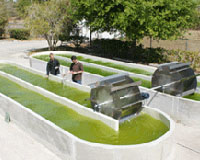 |
Paris (AFP) Jan 27, 2010 Gene scientists have coaxed bacteria into eating agricultural waste and secreting diesel, offering a potentially cheaper, greener energy source than present-day biofuels, a study released Wednesday said. Soaring demand for the current mainstay source for biodiesels -- corn, sugar and other starchy crops -- has caused the prices of some staple foods to soar as farmland is turned over to fuel crops, and worsened deforestation. Some researchers also doubt whether there is a significant net reduction in emissions of greenhouse gases, given the inputs needed from fossil fuels, in ploughing, fertilising, harvesting and processing and so on, to make biofuel. One problem is that oil from plants must first be chemically transformed. To purify ethanol, for example, it must be distilled from a fermentation broth. But biologists in the United States say they have invented a genetically-engineered version of a humble bacterium called Escherichia coli that could provide a cheaper, more effective alternative. It feasts on the simple sugars found in wood chips, straw and other biomass waste and secretes molecules of fuel. "We incorporated genes that enabled production of biodiesel directly," lead author Jay Keasling of Lawrence Berkeley National Laboratory in California said in an email to AFP. "The engineered E. coli secretes the biodiesel from the cell, which means that we don't need to break open the cell to get the diesel out. This saves substantially on processing cost," Keasling explained. In addition, "the biodiesel is insoluble in water, which means that it forms a separate phase when it is secreted from the engineered E. coli -- it floats to the top as any oil would. This also saves on processing costs." The study, published in the British science journal Nature, is a "proof-of-concept" piece of research. It did not detail any potential environmental impacts or estimates of costs. Keasling, though, said the findings were significant enough to warrant commercial products within one or two years, provided further increases on yield are met. The researchers further engineered E. coli to secrete enzymes that would degrade hemicellulose -- an important component of cellulosic biomass -- into its component sugars. "The importance of this development is that the organism can produce the fuel from a very inexpensive sugar supply," said Keasling. More than 7.6 billion litres (two billion gallons) of biofuels were consumed worldwide last year, and demand continues to increase. Finally, the study showed that with "just a few genetic manipulations" the malleable microbe can produce two other classes of chemicals -- fatty alcohols and aldehydes -- used to make soaps, detergents, cosmetic additives, scents and flavouring compounds. E. coli exists naturally -- in some strains, it notoriously causes food poisoning -- and is commonly used in industrial microbiology.
Share This Article With Planet Earth
Related Links Bio Fuel Technology and Application News
 The Environmental Impacts Of Algae-Based Biofuel
The Environmental Impacts Of Algae-Based BiofuelCharlottesville VA (SPX) Jan 27, 2010 With many companies investing heavily in algae-based biofuels, researchers from the University of Virginia's Department of Civil and Environmental Engineering have found there are significant environmental hurdles to overcome before fuel production ramps up. They propose using wastewater as a solution to some of these challenges. These findings come after ExxonMobil invested $600 million l ... read more |
|
| The content herein, unless otherwise known to be public domain, are Copyright 1995-2009 - SpaceDaily. AFP and UPI Wire Stories are copyright Agence France-Presse and United Press International. ESA Portal Reports are copyright European Space Agency. All NASA sourced material is public domain. Additional copyrights may apply in whole or part to other bona fide parties. Advertising does not imply endorsement,agreement or approval of any opinions, statements or information provided by SpaceDaily on any Web page published or hosted by SpaceDaily. Privacy Statement |